#vogue interview
Text

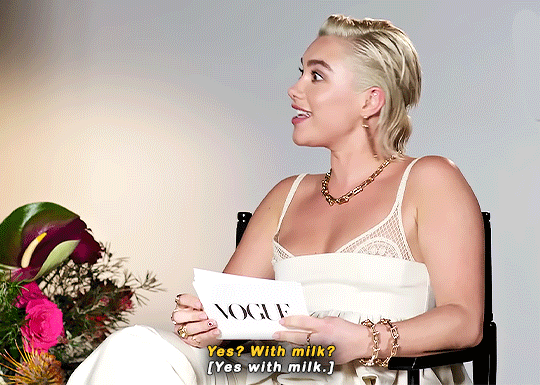

Coffee or tea? Tea. Yorkshire Tea.
#we all know who is to blame#zendaya#florence pugh#dune#dune press#vogue interview#dailywomen#fpughedit#soucezendaya#dailymarvelqueens#*
2K notes
·
View notes
Text
Bella Ramsey officially confirming their they/them pronouns and sexuality in an interview and then immediately following up with the fact that they do Multiplication tables for Fun
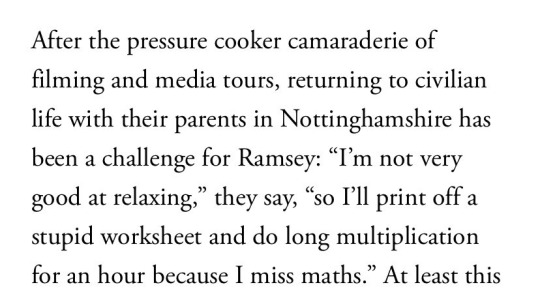
Yeah, overshadowed, who cares, I am focusing on this, this is the news story, honestly bone-chilling
#btw they were definitely already out but in this new interview have said they used to be Okay with she/they#but is now saying they would prefer just they/them#vogue interview#bella ramsey#last of us#nonbinary
210 notes
·
View notes
Text

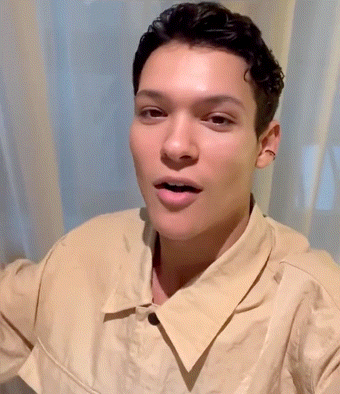
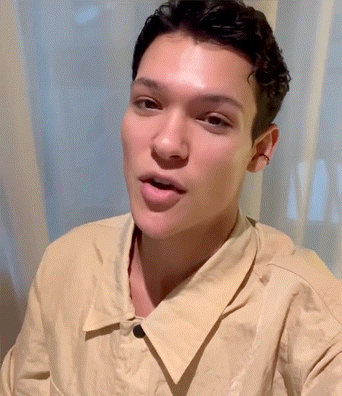
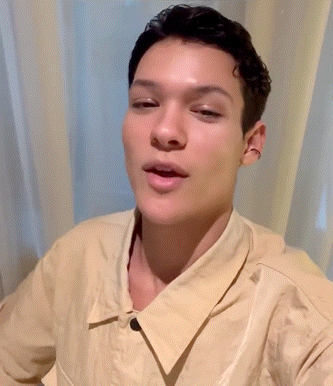
Peace and love. 💛
18 notes
·
View notes
Note
Not to start anything but Barry bringing up a Spiderman question and Jacob diverting from it is taking me out. He's such a shut stirrer LMAO!!! Also I think Jacob is fake deep because he really doest ever bring up filmbro films or anything deep. I know your ambivalent to Jacob but you also like pop culture so I hope this question isn't weird lol.
https://youtu.be/wZah12l7d-0?si=b8-AREDpHhoNbMqk
youtube
Awww!! Their interview together was actually pretty funny lol. 😄 They actually have REALLY good chemistry together lol....I was cracking up. 😅
Barry probably has great chemistry with just about everyone though. I had no idea Barry had a kid! 🥰
It's always nice when you see a cast that looks like they genuinely got along on set and have good chemistry with each other. It helps to sell the movie better imo.
I didn't think anything about the Spiderman comment. I'm sure Barry was just joking. JE seemed like he already had smthg in mind to say in response, and was already kind of mid-sentence, so I just think maybe he didn't really hear Barry or care to respond to it lol 😆
Barry probably knows that JE doesn't ever want to do any comic book superhero films anyway, so that's probably why he made that joke.
14 notes
·
View notes
Video

36 notes
·
View notes
Text
vogue: “Karlie Kloss and Tabria Majors Discuss the Physical Toll (and Joy) of Motherhood” by Audrey Noble
“Are you by chance part of the mom tribe?” Karlie Kloss asks me over the phone. It’s a natural—even expected—start to our conversation about the model and entrepreneur’s latest campaign for diaper brand Coterie, which is all about celebrating the physical journey of motherhood.
Though I am very much in my single, child-free era, motherhood is something that I hope is in the cards for me. And it is Kloss’s and fellow model and Coterie campaign costar Tabria Majors’s palpable excitement on my respective phone calls with each where they gushed about their little ones that strengthened my resolve to have a family of my own one day. (So much so, that I may or may not have enlisted their help to manifest it for me). Simply put: They love beings moms.
“It’s the greatest experience in my life,” Kloss tells Vogue. “I mean, maybe it’s the hormones, but it just gives me the greatest joy every single day to wake up and have these two little delicious humans whom I just love so much.”
“It’s just crazy to see how much she’s changed and seeing her little personality developing,” Majors says of her six-month-old daughter. “Just seeing her laugh all the time, it just warms my heart.”
The campaign, which debuted in early February, features Kloss (who invested in the Coterie late last year); Majors; board-certified pediatrician Dr. Mona Amin, MD; celebrity nail artist Mei Kawajiri; and influencer Reese Blutstein, sharing their pregnancy stories in hopes of inspiring others who might be struggling with the changes to their bodies—which is a topic that isn’t often spoken about.
Studies show that the rib cage can expand two to three inches and ligaments can stretch between the second and third trimester. According to the Mayo Clinic, the heart pumps 50 percent more blood to nourish the baby, while the American Academy of Dermatology notes that hair loss is prevalent in new moms. When you pair systemic failures in proper reproductive education with societal expectations to look “perfect” 24/7, many might feel confused and discouraged when witnessing their bodies go through major changes.
“You kind of just have to trust the process. I have learned to love and respect my body through this process, and with that comes changes,” says Kloss. “Of course, I have all the things like stretch marks and all the fun post-baby body things that I’m not mad at. They make me who I am, and I’m so grateful for that.”
Pre- and post-pregnancy can be a lonely experience, even if you are lucky enough to have a full support system. Which is why Majors says sharing pregnancy stories is important to help people feel less alone. She tells me about the outpour of love and support from fans over her birthing story has been an emotional, yet beautiful experience. She even recalls one woman messaging her and saying that her story encouraged her to proceed with her own home birthing—something that Majors says she will never forget. “I just thought that was really powerful and inspiring for me,” she says. “That just makes me feel really good that my story could impact somebody in such a way.”
It would be remiss to not acknowledge that the launch of Coterie’s campaign coincidently coincides with news of the Alabama Supreme Court ruling that embryos created through in vitro fertilization (IVF) are considered people, putting the legality of the procedure into question and further harming reproductive health care. The fight to protect reproductive rights is at the forefront during what is shaping to be a contentious presidential election year. These issues are not lost on either Kloss or Majors, who both intentionally pick brand partnerships that not only align with their personal beliefs but can also help make a difference. Both credit Coterie for creating a safe space for women to advocate for themselves.
“[I] hate that our bodies are being policed; I don’t understand how that’s even a thing. It makes no sense,” says Majors. “I think that’s why it's important for these partnerships to happen. [But] even outside of partnerships, you don’t have to be paid to speak up. You should just want to speak up naturally because this affects everybody on such a macro level.”
“It’s an individual's choice if and when they’re ready to become a parent. This is such a profound life change in every way and I think it should be an individual’s choice if and when they’re ready for that,” adds Kloss. “It [has] only reconfirmed my passion and commitment to fighting for reproductive rights, certainly in every state in this country.”
I ask them what’s the best mom advice they’ve received, and both give two truths that could be applied to all facets of life: Trust the timing of the universe and trust yourself. “You just have to learn to roll with the punches,” says Kloss. “Motherhood is messy and amazing. I think [it has] actually been so important for me to be more comfortable with not being able to control everything because that’s just the way it goes.”
“Trust your gut, trust your instinct,” adds Majors. “Especially as a first-time parent, you think that you don’t know anything (and you don’t), but you figure it out as you go along. And even if you didn’t research yourself to death, which I know everybody does nowadays, you will know what to do. You will figure out what to do. Your instincts will kick in, and it’s just a crazy feeling.”
Noted for my future self.
7 notes
·
View notes
Text
Rekha Ji on Vogue Arabia


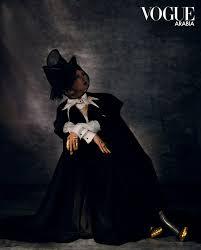

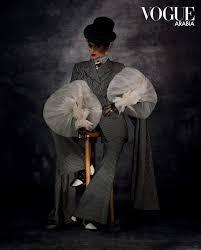


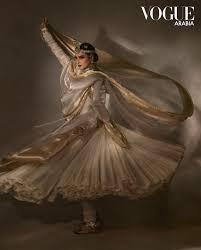


#rekha#vouge arabia#indian beauty#legend#vogue interview#goddess#Umrao Jaan#im so gay for her#shes a goddess#shes so hot#she#shes beauty#shes grace#you wish you were this pretty at her age#admit it
14 notes
·
View notes
Text
~ Quotes From Jennifer Lawrence’s New Vogue Interview That Make Me Want A Baby Right Now ~
-
“It’s so scary to talk about motherhood. Only because it’s so different for everybody. If I say, It was amazing from the start, some people will think, It wasn’t amazing for me at first, and feel bad. Fortunately I have so many girlfriends who were honest. Who were like, It’s scary. You might not connect right away. You might not fall in love right away. So I felt so prepared to be forgiving. I remember walking with one of my best friends at, like, nine months, and being like, Everyone keeps saying that I will love my baby more than my cat. But that’s not true. Maybe I’ll love him as much as my cat?”
But she did fall in love right away, and it does seem she loves her baby more than she loves her cat: “The morning after I gave birth, I felt like my whole life had started over. Like, Now is day one of my life. I just stared. I was just so in love. I also fell in love with all babies everywhere. Newborns are just so amazing. They’re these pink, swollen, fragile little survivors. Now I love all babies. Now I hear a baby crying in a restaurant and I’m like, Awwww, preciousssss.”
-
“So many of my films in the past have been about my mother, my childhood. I wonder what will happen now that I’ll be witnessing somebody else’s childhood. And I wonder what he’s going to be talking about with his therapist. She wouldn’t put me down. She kisses me on the mouth. She asked me not to go to college.”
-
It was the best thing ever, and yet totally terrifying. “My heart has stretched to a capacity that I didn’t know about. I include my husband in that. And then they’re both just, like, out there—walking around, crossing streets. He’s gonna drive one day. He’s gonna be a stupid teenager and be behind the wheel of a car. And I’m just gonna be like, Good night! You know? Like, who sleeps?”
-
Amid all this was the daily miracle of Cy, and the heart-exploding amount of love Lawrence felt for him. He just started smiling a couple of months ago and was now “on the precipice of laughing,” meaning he would smile so hard that the smile itself would become overwhelming and he’d have to roll his little head around to accommodate it. He recently tried avocado for the first time and she couldn’t stop crying. She jokes that her baby is her little voodoo doll, because everything that hurts him hurts her. “I mean the euphoria of Cy is just—Jesus, it’s impossible,” Lawrence said. “I always tell him, I love you so much it’s impossible.”
-
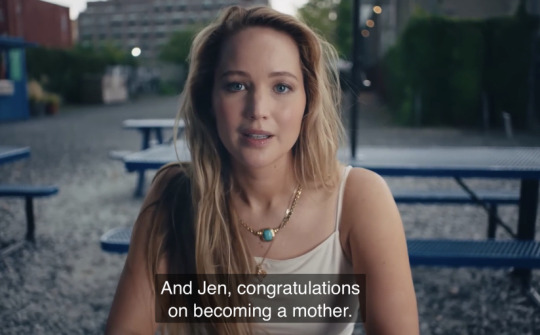
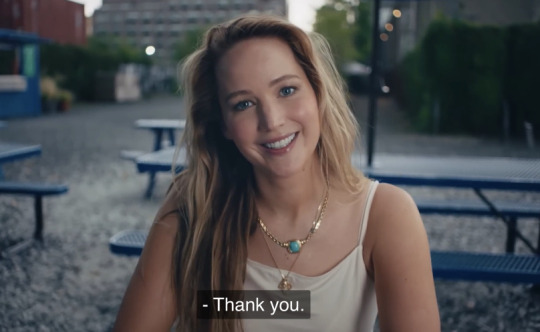
-
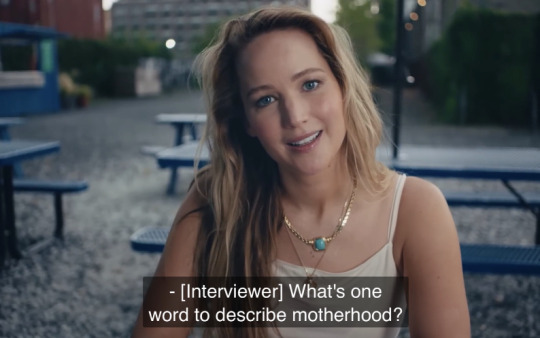




-
#the way her eyes lit up when talking about her baby !!!!#jennifer lawrence#Vogue interview#Vogue#jlaw#text post ✨✍🏻🤎#motherhood#babies#73 questions#celebrities#celebs#Hollywood
82 notes
·
View notes
Text
haven't read the whole thing yet but i felt the need to share some parts
they had a movie church for reference movies
greta threw a slumber party for barbies only, kens could stop by but not sleep over
"barbie has a great day everyday, ken only has a great day if barbie looks at him"
also this:
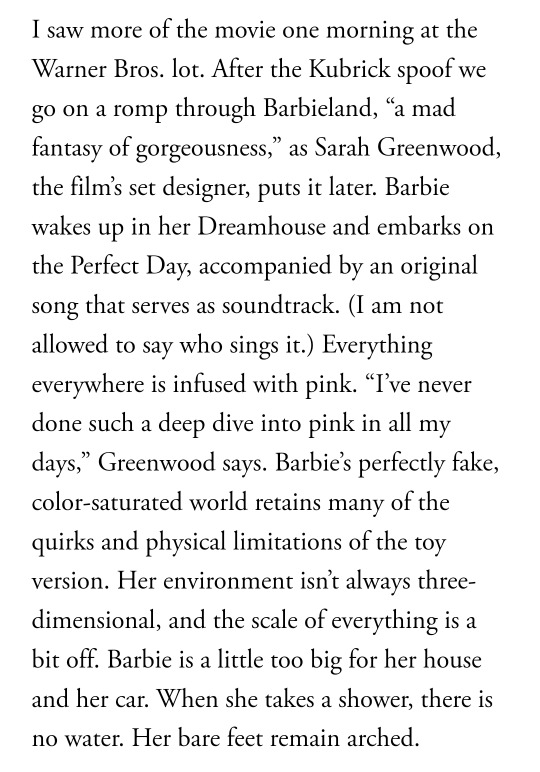
this is gonna be THE 2023 movie.
15 notes
·
View notes
Text
18 notes
·
View notes
Text
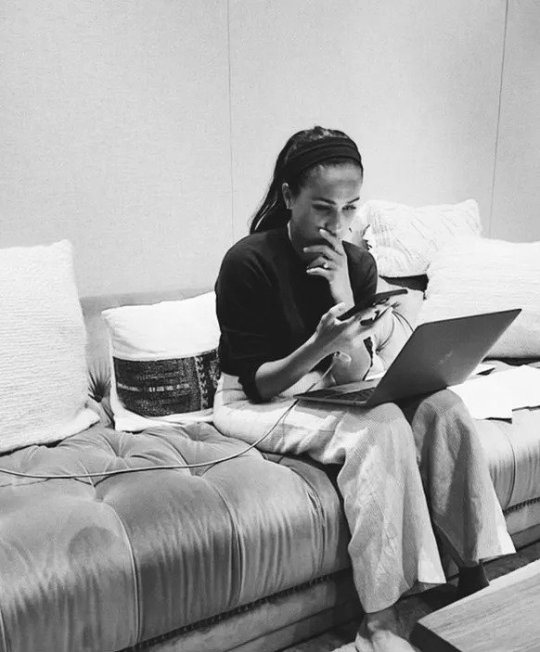
Gloria Steinem, the Duchess of Sussex, and Jessica Yellin on Abortion Rights, the ERA, and Why They Won’t Give Up Hope
On June 26—two days after the Supreme Court overturned Roe v. Wade—Jessica Yellin, the award-winning journalist and founder of the independent media company News Not Noise, called the two people she knew could put that seismic event into perspective. The first? Gloria Steinem. The second? Meghan, the Duchess of Sussex.
Steinem, the face of American feminism, and Meghan, a vocal advocate for paid leave and fair labor rights for women, have been friends since 2020. After Meghan learned that they were both sheltering in place in Montecito, California, she asked if Steinem wanted to help her make calls thanking voter-registration organizers. Steinem agreed.
That connection soon blossomed into an alliance, and for the past several months, Steinem and Meghan have been formulating a plan to get the Equal Rights Amendment (ERA) ratified. (“It would explicitly extend to women the rights granted in the Constitution to men,” Yellin tells Vogue. “The ERA would change the playing field for women’s reproductive rights, women’s workplace rights, and so much more. For decades Steinem has been advocating for its enactment, and now Meghan is joining in.”)
So, when the Supreme Court’s ruling came down, Yellin decided to moderate a conversation between the two advocates about their own reproductive choices, the realities of America pre-Roe and post-Roe, and, most importantly, where the country goes from here. “I entered this conversation feeling disoriented by the new reality—anxious that there is no clear path forward. Opponents of abortion built so much infrastructure over so many years. How can that be answered quickly, and how many lives will be destroyed in the meantime?” Yellin says. “For now, some women will be denied basic life-saving medical care because of a power struggle in a dysfunctional political system. But after this conversation, I was reminded that change starts with simple actions—and deadly setbacks sometimes precede transformational change.”
Read their wide-ranging conversation below.
Jessica Yellin: I hear from so many people—they’re feeling panic, confusion. They’re looking for guidance on what to do now. Let’s talk about the immediate impact of this ruling. Women in 13 states are seeing their reproductive rights vanish. And in another 13 they’ll likely be severely restricted. Tens of millions of women will have to make brutal choices, and we know that some will die. For people who were born after 1973 and have no idea what that was like, would you tell us a little about the reality of being a pregnant woman before Roe?
Gloria Steinem: There were underground networks, most famously Jane. That is where you called up a particular number and asked for Jane and that meant you needed an abortion. And there were women who bravely guided you. In my situation, I was in London, not this country, when I needed an abortion and was lucky to find a physician in the equivalent of the Yellow Pages, who said that if I promised him two things—one, that I would never tell anyone his name and two, that I would do what I wish to do with my life—he would send me to a woman doctor who would do the abortion. I dedicated a book to him. He’s no longer with us. So I thought it was okay, finally, after all these years, to do that.
Meghan, Duchess of Sussex: That gave me chills, Gloria. Also that you were in the hands of someone who understood that it was your choice to create the life that you wanted for yourself. That’s so powerful.
G.S.: Yes. And I kept my promise. Without him, I would have been stopped there. I was working as a waitress in London waiting for my visa to India, where I had a fellowship. I wouldn’t have been able to do that. My life would’ve stopped there.
Meghan, for women who live in the states where trigger laws have already gone into effect, they will learn quickly what life was like before Roe.
M: This is having a very real impact on women’s bodies and lives starting now. Women are already sharing stories of how their physical safety is being put in danger. Women with resources will travel to get an abortion, those without might attempt to give themselves one at tremendous risk. Some will have to source abortion pills from unregulated pharmacies. Others who are pregnant and find themselves in a medical emergency will be at the mercy of doctors and lawyers to determine if a procedure that is needed to save her life can even be done at all. What does this tell women? It tells us that our physical safety doesn’t matter, and as a result that we don’t matter. But we do. Women matter. And this is one of the reasons that I called Gloria immediately. Because in all of it, she reminds me that when you have anger, you have to channel that energy into something that makes a difference. That’s what activism is. It’s about how we show up.
G.S.: Meghan, I owe this friendship to you because I did not realize that in California, where I was sheltering on a friend’s ranch, we were neighbors—or at least what is called neighbors in California, which means you’re, what, a half-hour away. [Laughs.] It was you who realized that and came to the farmhouse where I was. Then we sat at the dining room table and made cold calls together.
M: I was thrilled. I was nervous too. I thought, Oh my goodness, how am I going to be in front of Gloria Steinem? The [presidential] election was coming up soon and we both knew the value of women and everyone getting out to vote. The ripple effect of elections matters so much, and that’s what we’re seeing now, unfortunately.
G.S.: A big part of the problem, of course, is that we have a Supreme Court that does not represent the country. Perhaps because I’ve been here longer, which means I’ve been here before, I say we are going to do what we need and wish to do. Something like one in three American women had an abortion when it was illegal. The need and the right to govern one’s own body continues. We need to translate it into a political reality.
Many of the states that are banning abortion, Meghan, are also those with the highest rates of maternal and infant mortality, especially for Black women. Across the U.S., Black women are almost three times more likely than white women to die in pregnancy or childbirth, and Black infants have twice the mortality rate of white infants. How concerned are you that this ruling will have an outsized impact on those women? And what specifically worries you?
M: These issues are systemic, interconnected, and preventable. Women of color and especially Black women are most impacted by these decisions because most of us don’t have the same access to health care, economic opportunity, mental health resources…the list goes on. It’s difficult to overstate what this decision is going to do to these communities.
G.S.: When I first entered into this struggle for reproductive freedom as a fundamental human right, it was the 1970s. Ruth Ginsburg was with the ACLU and she sent me to Alabama to talk with a Black woman who had been sterilized without her knowledge or permission when she went into the hospital for something else entirely. So, you know, this was a struggle with quite a few state legislatures to keep them from allowing the sterilization of women who were on public support.
Gloria, Representative Mary Miller of Illinois was at a Trump rally this weekend, and she thanked President Trump for “the historic victory for white life in the Supreme Court.” Her office insists that she misspoke and meant to say “right-to-life,” not white life, but her language does track with a strain of thought in the antiabortion movement that’s about race and demographics. Would you give us a little more context and history on that?
G.S.: There is a proportion of this country that is well aware that the first generation of babies who are majority babies of color has already been born. And that means that the country could and would become a country where people of color are the majority. Then we’ll look more like the rest of the world. But if you’re a white racist, it’s obviously frightening. So the same forces that were in favor of the forced sterilization of women of color on welfare are now frequently against abortion.
In his concurring opinion, Justice Clarence Thomas said that the court should “correct the error” of allowing for same-sex marriage, same-sex relationships, and even contraception. Legal analysts I trust argue that same-sex marriage is most at risk from this court. James Obergefell, who brought the case that legalized same-sex marriage, has warned it’s in danger. Meghan, how concerned are you not just for women, but for other groups who fought to gain rights in the U.S.? Do you think this is a canary-in-the-coal-mine moment?
M: Absolutely. We saw it in plain terms with Justice Thomas’s concurring opinion. This is a blueprint for reversing rights. The ruling is a signal about the future of same-sex marriage, contraception access, and many fundamental rights to privacy. It feels like the tip of the iceberg and is part of why people feel so scared. We have to channel that fear into action. We can start this November in the midterms. I know hearing that feels so repetitive, but we have to vote, every time, from local elections to state and national elections.
Editor’s note: “It’s worth remembering that abortion opponents did not win this victory overnight,” Yellin adds. “They formed the National Right to Life Committee in 1967, before Roe but just after the Griswold case, which legalized contraceptives for married couples. The Federalist Society, which gave legal intellectual heft to the movement, was founded in 1982. These groups and others worked for decades to elect politicians who would fill courts with anti-abortion judges.”
“When you have anger, you have to channel that energy into something that makes a difference. That’s what activism is. It’s about how we show up”
So, let’s talk about what can be done. People ask what they can get behind, where they can make a difference. Is the fight now at the state level, working for new laws and bringing challenges to existing restrictions? Is it getting out the vote nationally and electing pro-choice candidates? Where would you tell people to focus their attention?
G.S.: It depends where the person is. If they’re living in an anti-choice state or with a state that has a majority anti-choice legislature, then working politically is very important. If they’re in a pro-choice state where the clinics are being picketed or not supported, then it’s important to protect and support those clinics. But wherever we are, we can make clear that reproductive freedom is a fundamental right like freedom of speech.
M: It’s a much larger conversation about why for years, for decades, we’re fighting to get a constitutional amendment put through [the Equal Rights Amendment] that makes it clear that women can be treated equally, and how it is completely nonsensical that that’s even something we’re still fighting for. And Gloria, you know, we’ve talked about how to continue to push that through. I think now is probably the time more than ever before.
G.S.: We are the only democracy in the world that doesn’t include women in its constitution. I think we should put big billboards up in every airport where people arrive from other countries saying, “Welcome to the only democracy in the world that doesn’t include women.” Maybe that would embarrass people into action. All the necessary states have ratified [the ERA], and it just needs acceptance in Congress. So if the president made it a priority, it could happen. It means that we would be on the same standing of inclusiveness as every other democracy in the world.
Editor’s note: The ERA likely as the votes—all that’s needed now is the signature of the Archivist of the United States, who heads the National Archives and Records Administration. While proponents are calling on elected Democrats to get involved, opponents insist that the deadline to pass the ERA has expired.
Meghan, is that an issue you want to tackle?
M: Without question. Being home, seeing what’s happening in our country and feeling energized and motivated, if this is the type of legislation that we need pushed through, then this is a moment that I am absolutely going to show up for. Not just because it’s what we need as women, but it’s what we need as people.
G.S.: The ERA has been ratified by the requisite number of states and we should put the pressure on the White House and Congress to enact it.
M: Well, Gloria, maybe it seems as though you and I will be taking a trip to D.C. together soon.
There’s so much stigma around all this. I think it’s important to normalize conversations about abortion and women’s health. What do those topics bring up for you?
M: I think about how fortunate I felt to be able to have both of my children. I know what it feels like to have a connection to what is growing inside of your body. What happens with our bodies is so deeply personal, which can also lead to silence and stigma, even though so many of us deal with personal health crises. I know what miscarrying feels like, which I’ve talked about publicly. The more that we normalize conversation about the things that affect our lives and bodies, the more people are going to understand how necessary it is to have protections in place.
This is about women’s physical safety. It’s also about economic justice, individual autonomy, and who we are as a society. Nobody should be forced to make a decision they do not want to make, or is unsafe, or puts their own life in jeopardy. Frankly, whether it’s a woman being put in an unthinkable situation, a woman not ready to start a family, or even a couple who deserve to plan their family in a way that makes the most sense for them, it’s about having a choice. It’s interesting that here you’re talking to two women: one who chose to give birth happily, and one who chose not to give birth happily. And we’re both prospering because we were able to make our own choices. Incredible.
G.S.: This is as old as human beings. I remember a couple of decades ago sitting with women in the Kalahari Desert as they showed me one plant that they used to increase fertility and one that they used as an abortifacient. This is hardly a new consideration, and in our Native American cultures here, too, it was understood.
It’s worth saying this shouldn’t just be on women. There is never an abortion without sperm. What would you say to men who support reproductive rights?
M: Men need to be vocal in this moment and beyond because these are decisions that affect relationships, families, and communities at large. They may target women, but the consequences impact all of us. My husband and I talked about that a lot over the past few days. He’s a feminist too.
G.S.: Yes—I can testify to that since I met him before I met you. He was at a big meeting I attended and he was advocating for people’s rights.
M: And his reaction last week was guttural, like mine. I know that for so many women right now, there is a sentiment of despair. But again, we have to band together and not wallow. We have to do the work.
G.S.: Also, you and I are in states where there is reproductive freedom—New York and California. So it is a state-by-state question, and unfortunately the Supreme Court has allowed it to remain a state-by-state question.
Gloria, what kind of impact does it have when people like Meghan and Harry own this issue, speaking openly about abortion and equal rights and reproductive access—a happy man and woman with a huge public platform?
G.S.: It’s very, very, very important. Because what they both have is trust. We trust them and nothing but nothing replaces trust. It is the most important quality or attribute. We can see things on television and not believe them or not trust them. But when people like these two tell us, then we trust it.
M: Thank you. That’s really kind
Gloria, I’m listening to this conversation and I wonder, are you passing the baton to another generation and a new voice to help carry forward the work you’ve done?
G.S.: Well, you know, it’s true, though I plan to live to 100.
We hope you do!
M: You will. My goodness, Gloria, I hope it’s even longer than 100. And you’ll still be wearing these incredible leather pants.
G.S.: I do have to recognize my own age, but I’m not passing the baton. I’m keeping the baton, but understanding that we each have a baton; there’s not just one.
Meghan, what do you think this moment requires?
M: This moment requires unity—really listening to people, understanding the Constitution was written at a time when women were second-class citizens. We’re not. Certain things need to change. I think it’s equally about honoring the people who’ve been doing the work long before us, like Gloria. I’m grateful that I’m holding a baton right there next to her and that we will continue to be doing this work together.
G.S.: Yes, we are chosen family. I feel just as thankful to Meghan for being the present, the future—for taking risks of criticism by standing up for what she believes in and what the majority needs.
M: I always look at things with the undercurrent of hope. If you are someone who truly believes that there can be something better, if you’re someone who sees injustice, you have a choice: You can sit there and be complacent and watch it, or you can say, “What can I do to get us to the other side of this?” That’s another reason why I called Gloria, because I knew what I was looking for. What do we do? How do we do it? How do we support each other? How do we get the necessary changes across the line? What we need, in this moment, is to start with hope.
GS: I think we need to remember that hope is a form of planning. [Laughs.] If you’re not hopeful, you’ve given up.
VOGUE, June 2022
#duchess of sussex#lili's mum#archie's mum#vogue interview#roe v wade#women's reproductive rights#abortion rights#june 2022
40 notes
·
View notes
Text
Why are celebrities on what’s in my bag so surprised by the stuff that is in their bag. It’s your bag bestie, where’s the confusion coming from
#like do you not remember packing it?#there’s some fake ad house tour staging shit going on there 100%#oh! tea? yes I always have tea bags in my purse#the way you reacted no you don’t#???#everything is so manufactured ughhh#what’s in my bag#I can bet a $1000 you’ve never seen that chapstick before in your life#celebrity interviews#vogue interview#I can tag so many celebrities here but should I?
2 notes
·
View notes
Text
Now why did Vogue have to go and try and embarrass our girl like this?? 😅
"Happy Smiley FACES!!!!" 😅🤣

"Moving on!!!" LOLLL
Aww!!! Idk why Z is so embarrassed by that old video lol.... I think it's precious lol. 🥰🥹
18 notes
·
View notes
Text


so normal about this
9 notes
·
View notes
Text

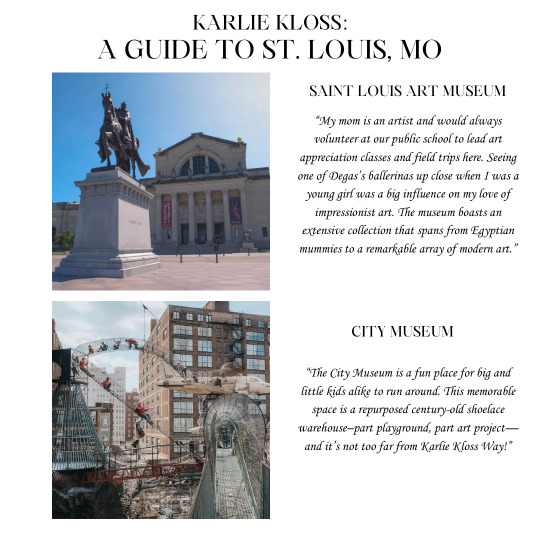
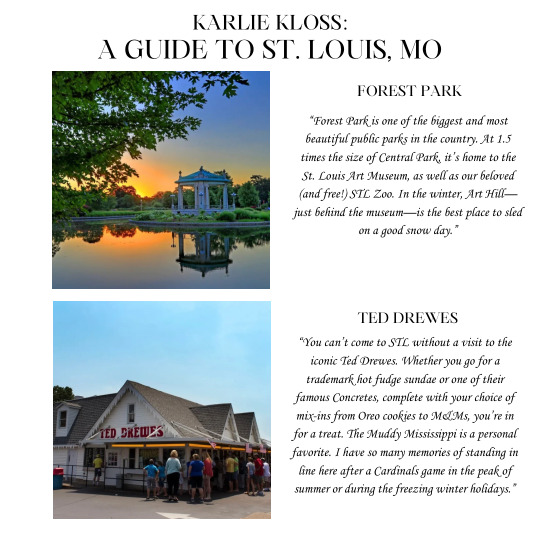
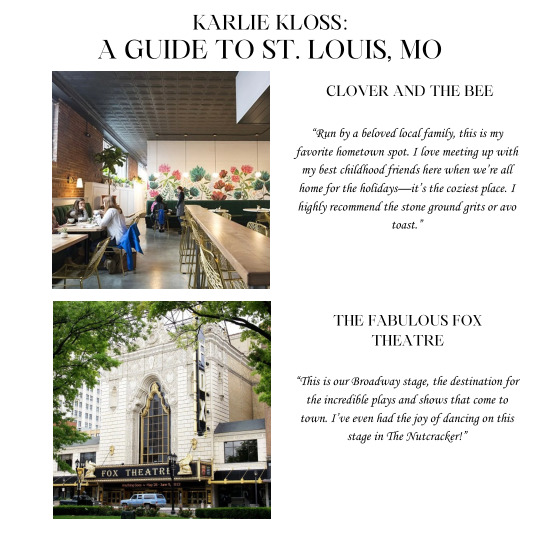

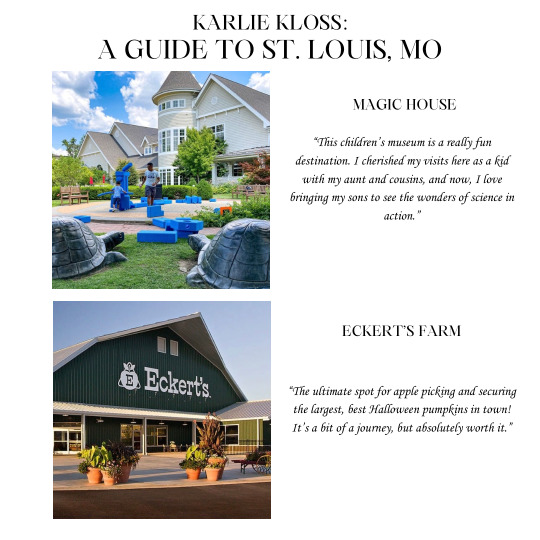

a guide to st. louis, missouri by karlie kloss
read the interview
3 notes
·
View notes
Text
youtube
This makes me realize how much Taylor and I have in common. Plus, we could talk about writing and our up-and-down relationships with boys. And have Friends & Dateline marathons. And listen to good music. And we're almost the same age.
We seem so alike that I think we would either be REALLY close friends or REALLY dislike each other. I'm really not sure which.
1 note
·
View note